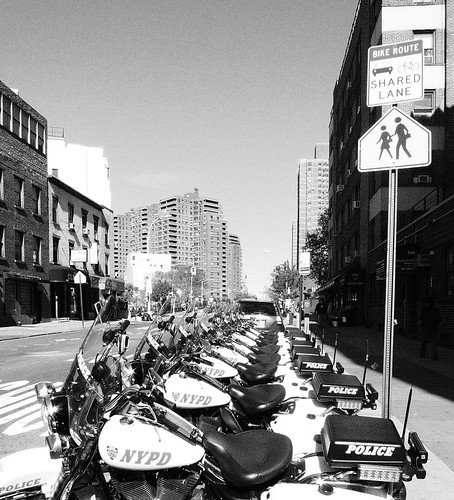05.19.11THUNDERTOME II: ROUND 3SURVIVOR: anna karenina (leo tolstoy)*
CHALLENGER: war and peace (leo tolstoy)
reading
war and peace is the THUNDERTOME equivalent, i think, of occasioning and blogging a
birth story; i'll skip over most of the grand-guignol and/or fairly obvious implications of that analogy and say that strangers were terribly kind to me on the subway for the last few months and i'd think twice about doing it again without drugs.
bearing in mind that i don't speak much russian, you probably don't, either, and discussing the relative merits of various translations can make it awfully difficult to operate heavy machinery, i'll open with a few words about
the edition i chose. i went with
aylmer and louise maude, the same husband-and-wife team that tackled
my edition of
anna karenina; both maudes were friends of tolstoy's, aylmer visited his estate several times and eventually became his biographer, and count leo is
said to have said that "better translators...could not be invented." the maudes certainly have a leg up on other translators when it comes to biographical footnotes: aylmer pops up all over the place to point out where characters' opinions overlap with tolstoy's own, and where those characters themselves might have counterparts in his family (old count rostov, for example, is ilya andreyevich tolstoy, leo's paternal grandfather). they're also helpful as a general proposition: i myself hadn't noticed that (the fictional) napoleon takes snuff whenever he's upset. cheers, maudes!
there are two big issues with this translation, depending on where you're sitting. as james wood puts it in his
admiring new yorker review of richard pevear and larissa volokhonsky's
translation of
war and peace,
Literary translators tend to divide into what one could call originalists and activists. The former honor the original text’s quiddities, and strive to reproduce them as accurately as possible in the translated language; the latter are less concerned with literal accuracy than with the transposed musical appeal of the new work. Any decent translator must be a bit of both.
wood puts pevear and volokhonsky in the first category and compares them favorably with the maudes, whose activism, he argues, strips tolstoy's language of much of its urgency (that he used the same descriptors over and over is part of his vitality and charm, and so on). at the other end of the spectrum,
the australian's peter craven
argues that the maudes' activist translation gives their texts a "flow and purr" which glides across the "hideous infelicities" of, you know, translating a crazy language such as russian (no matter whose grammar is on the table, really) into english. he also notes that david foster wallace, for what it's worth, found pevear/volokhonsky "somewhat starchy."** me? i love a good russian quiddity; one of my favorite things about gogol's
dead souls, for example, is how the omniscient narrator participates in the story by saving long expository paragraphs for real-time lulls (such as a character descending a staircase). that said, i needed all the help i could get with my first slog through
war and peace, and i'm comfortable with the idea that some of tolstoy's language was pre-chewed for me.
the second issue with the maude
war and peace is both more superficial and infinitely more serious: the summarizing chapter subtitles spoiled
every last plot point. twelve hundred pages of napoleonic wars and narcissistic russian tweens are no joke, team; when a chapter begins with
20. Pierre at the Rostovs'. Natasha again takes up her singing. Sonya reads Alexander's manifesto. Petya declares he will enter the army. Natasha realizes that Pierre loves her. He decides to cease going to the Rostovs'
what's left? i appreciated knowing when to brace myself for a torrent of tolstoy's amateur historiography, but jesus. if you're able to find a maude edition without the spoilers, then, i think it's a solid choice; if not, first-time reader, get thee a patient friend with a fat black marker or find another translation.
right, then. plot! a wise fellow reader*** noted that
war and peace is full of "
frat boys, man," and it is indeed; the first few books are rampant with overfunded st. petersburg man-boys who get drunk and dangle out of windows, tie a policeman to a bear and dump them in a canal, and so on. the year is 1805, napoleon is charging east, and many of these underoccupied rascals become underoccupied officers in emperor alexander's army. the man-boy pierre bezukhov (the portly, illegitimate son of a fantastically wealthy count) inherits his father's fortune, decides to skip the war, and is instead married to a slippery society woman; he then pursues fraternity of another sort and becomes a freemason (tolstoy's laborious descriptions of the russian masons' initiation ceremonies are
war and peace's equivalent of the intricate voting procedures in
anna karenina, with masks and swords taking the place of lockboxes and ping pong balls). as napoleon's men near and occupy the towns en route to moscow (and, eventually, moscow itself), pierre wanders among the russian troops and straight through battlefields; though tolstoy starts in on battle scenes at the beginning of the book, it isn't until pierre witnesses the execution of russian prisoners toward its end that we're able to appreciate what's at stake. i admit that i found those chaotic early scenes deeply annoying, but tolstoy knows what he's about; as wood puts it, he's estranging us from what we know of war ("again and again, he reverses the martial tapestry and shoves the clumsy, illegible tufts of thread at us"). the final, intimate bits of violence at the end of the novel, offered from a perspective that's been essentially childlike for a thousand pages or so, made me shiver.
war and peace is also the story of two families. one is the bolkonskis of bald hills, an abusively moody old widower and his sober son (andrew; there's that activist translation for you) and daughter (mary; ditto); according to aylmer maude, prince andrew voices many of tolstoy's feelings about war. he's one of the few officers who seems emotionally invested in the conflict, he delivers a number of nihilistic speeches in the last third of the book as whistling mortars rearrange the scenery he chews, and he appears to be mostly indestructible. in the city, in turn, we meet the rostovs, a good-natured, messily self-indulgent crew on their way out of the upper class thanks to a patriarch and eldest son who can't keep their wallets in their pants. young natasha rostova is probably representative of something irrepressible and joyous about the russian spirit; she's also the humanoid equivalent of
total request live, and she terrifies and repulses me (i strongly suspect one of her love interests dies to escape her).
war and peace's families heave about much as various families do in
anna karenina; tolstoy streamlines their interactions and paces their intrigues more naturally in the latter, however. most of
war and peace's domestic plot development takes place in an inelegant rush at the end of the novel, and i was left with the distinct feeling that ol' leo was tossing out a handful of awkward fifth-act marriages to wrap things up and set the stage for his lethal concluding nonfictional discourse on conflicts and history.
on that discourse, i'm aware that looking to tolstoy for coherent historiography is a bit like looking to
malcolm gladwell for a bodice-ripper, but ah, my foes, and oh, my friends, its torpid mediocrity is still a shock. quoth wood,
[T]he epilogue concludes not with the fictional narrative but with a final, dragonish blast from the flaming, irritable, essay-writing Tolstoy, eager to put us right about freedom and predestination. “War and Peace” is “not a novel” but a frequently essayistic national epic...
were i a patriotic man of letters with a strong interest in shaping the way future generations understood my century's big-ticket verbs and a fondness for the rhetoric of repetition, i could imagine wanting to describe war in a thousand slightly different ways. as i am but a youngish editor who blogs for personal amusement and is keenly aware that most of her handful of readers feel at the end of THUNDERTOME that they've run a marathon in ice skates, i'll ignore the epilogue and give you a brief moment with napoleon instead.
"Our fire is mowing them down by rows, but still they hold on," said the adjutant.
"They want more!..." said Napoleon in a hoarse voice.
"Sire?" asked the adjutant who had not heard the remark.
"They want more!" croaked Napoleon frowning. "Let them have it!"
Even before he gave that order the thing he did not desire, and for which he gave the order only because he thought it was expected of him, was being done. And he fell back into that artificial realm of imaginary greatness, and again - as a horse walking a treadmill thinks it is doing something for itself - he submissively fulfilled the sad, gloomy, and inhuman role predestined for him.
that's the leo i know and love.
VICTOR: anna karenina. tolstoy had smoother moves once war and peace was under his belt; napoleon in the guts of a novel about families is as unwieldy as the little prince's elephant in a snake. indeed, why is it that big people always need explanations?
imaginary reading group discussion questions
01 have you read war and peace? would you read it again?
02 activism v. originalism: pick a side.
03 have you ever felt you deserved a push present for finishing a book?
04 did you know nine inch nails' "dead souls" from the crow soundtrack was a remake of a joy division b-side? i sure didn't.
05 what would you use to tie a policeman to a bear? assuming you had a good reason for doing so, i mean.
06 why would one need to tie a policeman to a bear?
07 when was the last time a battle scene made you shiver?
08 anna karenina's kitty scherbatsky and war and peace's natasha rostov: which one has a friends-only facebook profile? (not a rhetorical question. they both have facebook profiles.)
09 okay, malcolm gladwell. what's your bodice-ripper called? (no, not the ripping point).
10 why do big people always need explanations?
*previous battle here.
**in "joseph frank's dostoevsky," from consider the lobster.
***if possible, have a wise fellow reader when attempting war and peace. not mine, mind you - i need her as a wing man when i read other things.






